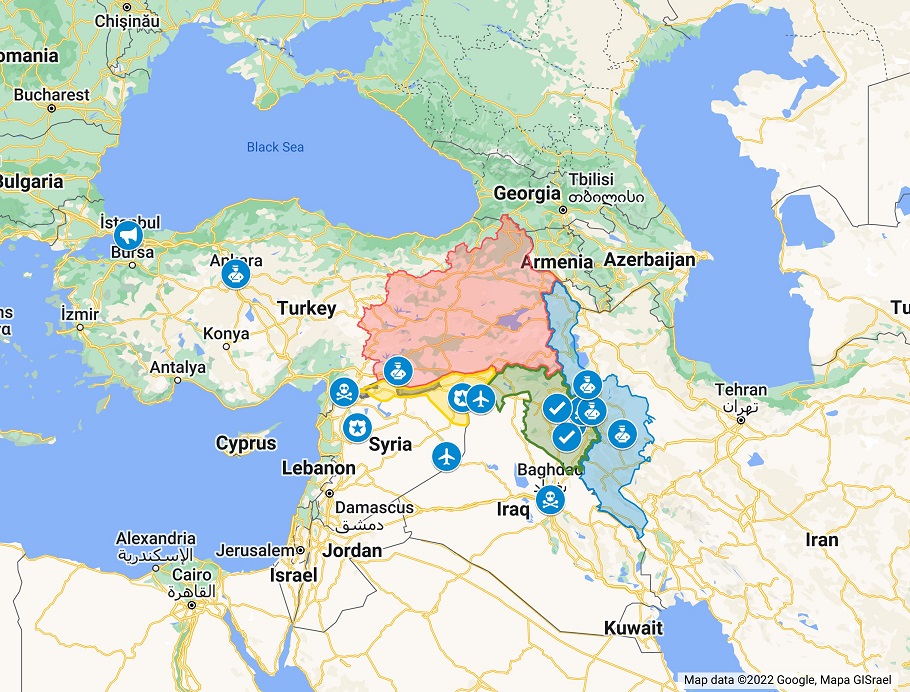1.5K
A weekly brief of events occurred in the Kurdistan regions of Iran, Iraq, Syria, and Turkey.
Iran
- Dozens of political parties and organizations, including exiled Kurdish and non-Kurdish opposition parties, congratulated the Kurdistan Democratic Party of Iran (KDP-I) for its reunification with the Democratic Party of Iranian Kurdistan (PDKI). Both wings of the KDP-I agreed to hold a party congress within the next year and appointed an interim leader, Mustafa Hijri, and designated Khalid Azizi as spokesperson.
- Iranian security forces arrested activists Omed Ibrahimi in Shinno and Jamal Alawi in Mehabad. Iranian authorities also detained two civilians, Rebwar Talibi and Mohammed Bapander, in Baneh. Concurrently, Iranian intelligence officers (Ettela’at) in Sanandaj warned a female activist named Arazo Amjadi to refrain from participating in events or social activities.
- Iranian border guards killed two Kurdish border porters (kolbars), Aras Mohammadpour and Rebwar Rashidi, near Baneh. At the same time, a mine from the Iran-Iraq War killed a 70-year-old man named Khasrow Chandaro near Gilanegharb.
Iraq
- Muqtada al Sadr announced his “resignation” from politics on August 29. Earlier that day, Grand Ayatollah Kadhim al Haeri quit his post and called for “obedience to the leader of the Islamic Revolution, Ali Khamenei.” Al Sadr criticized al Haeri and said Najaf remains home to the Maraji, who serve as sources of emulation for Twelver Shi’a. Thousands of al Sadr’s supporters also stormed government buildings in Baghdad and several provinces, including the government palace and prime minister’s office. Iraqi Prime Minister Mustafa al Kadhimi responded by postponing cabinet meetings and imposing a curfew across all of Iraq except for the Kurdistan Region. Concurrently, the United Nations Assistance Mission for Iraq (UNAMI) called for protestors to “leave Baghdad’s international zone, vacate all governmental buildings, and allow the government to carry out its responsibilities” after Sadrists stormed the Green Zone. Twenty Sadrists were killed and dozens were wounded in clashes with Iraqi security forces. Iraqi security forces also fought with Muqtada al Sadr’s militia, Saraya al Salam, in Baghdad and Basra on Monday night. Several protesters accused “Iranian” forces of firing on demonstrators. Al Sadr’s resignation comes after his demand for Iraq’s Federal Supreme Court to dissolve the Council of Representatives within 48 hours went unheeded due to the court’s claimed lack of legal authority. President of Kurdistan Region Nechirvan Barzani responded to Monday’s events by urging the involved parties to “return to logic” and hold a “national dialogue.” Meanwhile, Iranian-backed militias in Kirkuk began moving towards Erbil and Sulaymaniyah checkpoints to ostensibly counter the deployment of Peshmerga forces. On Tuesday, al Sadr told his supporters to withdraw from the Green Zone and the Iraqi government lifted curfews.
- Peshmerga forces defused three Katyusha launchers that were aimed at the natural gas facility run by the UAE-based Dana Gas near Qadir Karam. Iranian-backed militias have attacked gas fields in Iraqi Kurdistan several times since the Kurdistan Regional Government (KRG) announced plans to export natural gas to Turkey and Europe. Separately, Kurdish security forces announced the arrest of four ISIS (Da’esh) terrorists that were planning attacks and assassinations in Bazyan.
- Turkish drones struck the Makhmour refugee camp and a location near Shingal (Sinjar) on Monday. Preliminary reports indicated the attack killed and wounded several people.
Syria
- The Syrian Democratic Forces (SDF) and the local security forces (Asayesh) launched a massive military operation inside the al Hol Camp, holding Da’esh families and captives. The three-day operation resulted in the arrest of 48 suspects and the discovery of several tunnels and tents used by sleeper cells for “training children and holding Sharia courses.” Terrorist have committed dozens of crimes against women in the camp in 2022, leaving the security forces to contend with it. The SDF also announced the arrest of twenty-three Da’esh suspects and drug dealers in Junaynah villages in Deir Ez Zor.
- Turkish-backed factions arrested more than a dozen Kurds last week in occupied Afrin. The Syrian Observatory for Human Rights (SOHR) reported most detainees are accused of working with the former Kurdish administration. At the same time, Turkish proxies also seized seven houses belonging to Kurds.
- On August 24, the United States Central Command (CENTCOM) released a statement announcing attacks on Iranian-backed militias in Syria, responsible for shelling US troops. Earlier, on the same day, the US struck several bunkers in Deir Ez Zor which were being used by Iranian proxies to attack the US troops. “The United States does not seek conflict with Iran, but we will continue to take the measures necessary to protect and defend our people.” read the CENTCOM statement.
Turkey
- The US Treasury Department warned Turkish companies against working with Russian companies and breaking the sanctions imposed by the west. More than ten Turkish companies so far have acquired or sought Russian assets. The US also rejected the normalization efforts between Turkey and Syria. “The US does not intend to upgrade our diplomatic relations with the Assad regime, and we don’t support other countries normalizing their relations, either,” said Vedant Patel, Deputy Spokesperson for the Department of State.
- Turkish police arrested six people in Ankara over social media posts criticizing the government. In Urfa, the police detained the father of a Roboski victim, without a warrant. In Sweden, a Kurdish activist named Zinar Bozkurt remained in custody, facing deportation to Turkey after a deal between the government and Turkey over NATO membership. Civil organizations expressed concerns, but Bozkurt’s asylum case is under review.

